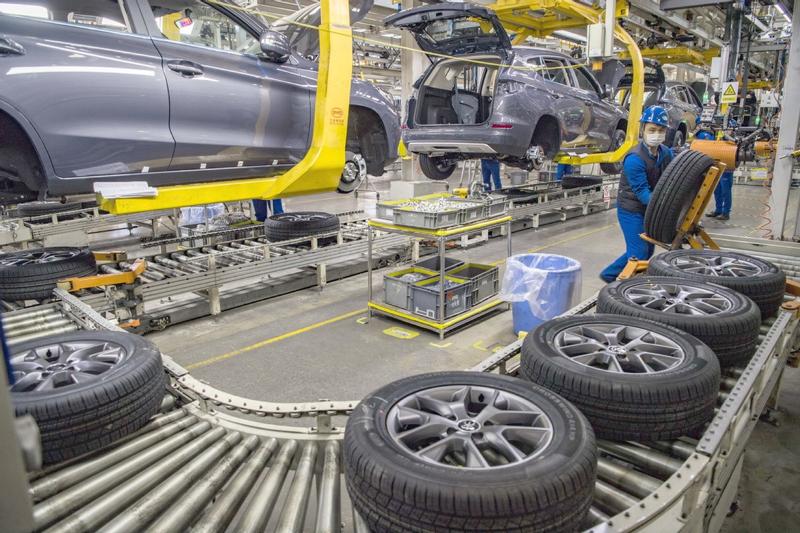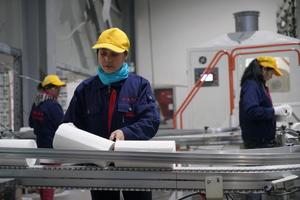 Staff members work at a tire production line for new energy vehicles at a Xi'an plant of BYD Auto in Shaanxi province in January 2021. (PHOTO BY YUAN JINGZHI / FOR CHINA DAILY)
Staff members work at a tire production line for new energy vehicles at a Xi'an plant of BYD Auto in Shaanxi province in January 2021. (PHOTO BY YUAN JINGZHI / FOR CHINA DAILY)
Factories in China will become increasingly green as companies scramble to pursue high-quality development and the nation works hard to achieve carbon neutrality by 2060, officials and company executives said.
Xiao Yaqing, minister of industry and information technology, the country's top industry regulator, said that as 2021 is the first year of the 14th Five-Year Plan period (2021-25), the nation will make more efforts to cut carbon emissions in the industrial sector and roll out plans for key sectors to achieve the goal of peaking carbon emissions.
Efforts will be made to strictly control new production capacity in heavy and chemical industries, and cut crude steel output to ensure it falls year after year, Xiao said.
China has put in place a green manufacturing system, with 2,121 green factories and 171 green industrial parks built over the past five years. These green plants are assessed in five aspects, including green production, supplier management, green logistics, green recycling and green information disclosure, Xiao added.
The country will encourage industrial firms and parks to build green microgrids and prioritize the use of renewable energy, the minister said, adding that efforts will be made to formulate a road map for the auto sector to meet these goals, promote the development of electric vehicles and boost the recycling of batteries for new energy vehicles.
The remarks came after China announced that it will strive to peak carbon dioxide emissions by 2030 and achieve carbon neutrality by 2060. Green manufacturing is a key push to meet the goals given China's position as a global manufacturing powerhouse and its sprawling industrial economy, experts said.
ALSO READ: Urban areas key to 2060 carbon goal
Li Yizhong, honorary chairman of the Green Manufacturing Association of China, said earlier that green manufacturing is an essential part of China's manufacturing upgrade push. It is not only a company's social responsibility but also can become its core competency and help improve efficiency.
China will encourage industrial firms and parks to build green microgrids and prioritize the use of renewable energy, the minister said, adding that efforts will be made to formulate a road map for the auto sector to meet these goals, promote the development of electric vehicles and boost the recycling of batteries for new energy vehicles.
Xiao Yaqing, Minister of Industry and Information Technology
CGreen manufacturing is not merely about energy conservation and emissions reduction, and it doesn't only concern heavy industries and heavily polluting enterprises. It's a common concern of all industries such as steel, nonferrous metals, chemical engineering, building materials, papermaking, printing and dyeing. Each company shoulders responsibility to develop green manufacturing, Li said.
Only green manufacturing can ensure a better quality of life while protecting the environment at the same time and make China a really strong manufacturing country, Li said.
Zhang Mingsheng, a technical employee at Gree Electric Appliances, said green manufacturing should run through products' full life cycle and contain diverse content such as green design, green production, green operation, green recycling, green energy application, green packaging, green marketing and green trade.
"Gree Electric Appliances, as the leader of China's appliances industry, has made great efforts in green design, especially highly energy-efficient products. The research and development of a special compressor, our core technology, has helped to improve the company's manufacturing energy efficiency and product energy efficiency," Zhang said.
Green manufacturing refers to various fields and each industry is at a different level. The association aims to promote communication and cooperation for green manufacturing development between both traditional and new industries.
Li Lingshen, vice-president of the China National Textile and Apparel Council, said: "Green manufacturing is a strategic choice for the textile industry because whether we talk about products or manufacturing processes, we must make sure they are green and environmentally friendly. To make sure the products are good for people's health and the production process doesn't harm the ecosystem is our inevitable responsibility and we need cross-industry cooperation to integrate resources."
With more than 4.9 million new energy vehicles on China's roads, spent car batteries are also a major environmental concern, and the government is working hard to solve the problem.
ALSO READ: Report: China's NEV market to boom in next five years
In 2018, the Ministry of Industry and Information Technology and five other government bodies published a guideline on management of the recycling and reuse of spent batteries.
The guideline was aimed at introducing an "extended producer responsibility" system in the industry under which manufacturers will shoulder the responsibility of disposing of spent cells.
Meanwhile, a guideline the ministry published in July 2018 pledged to build a "traceability management system" that will cover every procedure related to batteries, from production to recycling and reuse.
In 2020, 85 vehicle battery recycling companies were registered in China, bringing the total number of such companies in the nation to 242, according to corporate information tracker Tianyancha.
 Employees work at a paper products factory in Chishui, Guizhou province, in January 2021. The products are made of environmentally friendly bamboo. (PHOTO / XINHUA)
Employees work at a paper products factory in Chishui, Guizhou province, in January 2021. The products are made of environmentally friendly bamboo. (PHOTO / XINHUA)
Zhou Zerun, a technical expert in the battery operation department of Chinese electric carmaker Nio, said the company has established an 800 million yuan (US$123.68 million) joint venture with partners including CATL, China's largest automotive lithium-ion battery maker.
The JV's goal is to not just recycle spent batteries, but carry out the full-life cycle management of batteries, from upstream supply chains, production and vehicle service, decommissioning and finally material recycling, Zhou said.
Amid China's strong commitment to green manufacturing, foreign companies are also partnering with local suppliers to better protect the environment while producing high-quality products.
US smartphone giant Apple Inc, for instance, has set strict requirements and asked its suppliers to perform audits of their energy use and then implement projects to reduce their carbon footprint.
In 2019, nine additional Apple supplier facilities received the Ministry of Industry and Information Technology's green factory designation, bringing the total number of Apple supplier facilities awarded this designation to 28, according to Apple's Supplier Responsibility 2020 Progress Report. Apple is also supporting the China Electronic Standardization Institute by helping to develop green standards for electronics manufacturing in China.
One of the best examples of Apple's green initiatives in China is water stewardship. In Kunshan, Jiangsu province, Apple has been working to enroll suppliers in the area in its clean water program for many years, integrating water conservation practices into operations.
Later, Apple realized that conservation alone is not enough when it comes to water in Kunshan and many other places in the world. In 2018, the company launched a partnership with the Alliance for Water Stewardship to elevate its supply chain to a new level of environmental sustainability.
AWS is a global program that fosters collaboration between businesses, governments and civil society, offering a framework and standard for water stewardship. Water stewardship requires companies to take a broader view, working transparently and collaboratively with a broad range of stakeholders to take better care of precious water resources in their basins.
"I explain water stewardship to companies as responsible management of something they don't own," said AWS Regional Manager Xu Zhenzhen, who trains companies to apply stewardship concepts to their operations in preparation for earning AWS certification. "Without understanding where your water comes from, you can't understand the dynamics. We're talking about upstream and downstream, your impact on others, and how you are going to be affected by water quality or scarcity issues," Xu said.
The AWS certification process requires companies to collect information about water quantity and quality in their basin, and to understand source water security and risks. It also requires them to understand how their wastewater discharge impacts local water quality and habitats.
Xu coached companies on how stewardship is not just about environmental protection, but also good business, helping to improve relationships with neighbors and local governments.
Flexium, an Apple supplier of flexible circuit boards located in Kunshan, was the first company in the electronics industry to earn an AWS gold certification.
READ MORE: Asia electronics sector booms, bucking global economic slump
Cao Bo, Flexium's environmental compliance manager, said: "After Xu introduced the AWS certification to us, we decided to pursue it. We felt we had to make that extra effort."


